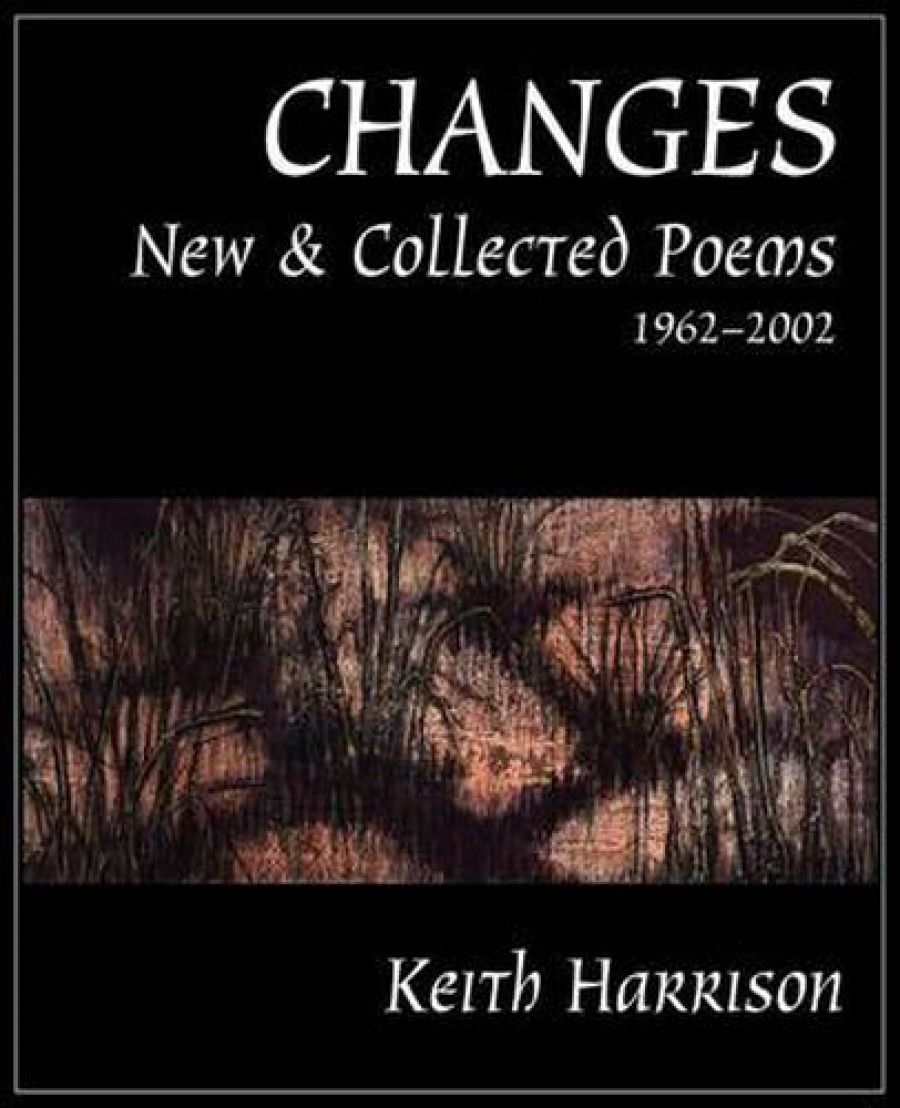
- Free Article: No
- Contents Category: Poetry
- Custom Article Title: The Hum of Bees
- Review Article: Yes
- Article Title: The Hum of Bees
- Online Only: No
- Custom Highlight Text:
The word ‘collected’ on a book of poems has its embedded dangers. Collected Poems are like autobiographies: they encourage readers to confuse them with the writer’s flow of life. And we can all see what’s wrong with that, I hope. That cagey old player, W.H. Auden, issued this injunction:
Great writers who have shown mankind
An order it has yet to find,
What if all critics say of you
As personalities be true?
You had the patience that survives
Soiled, shabby, egotistic lives …He also refused to write an autobiography.
- Book 1 Title: Changes
- Book 1 Subtitle: New & collected poems 1962-2002
- Book 1 Biblio: Black Willow Press, $25 pb, 374 pp
- Book 1 Cover Small (400 x 600):

- Book 1 Cover (800 x 1200):

But all this is tangential to Keith Harrison’s Changes, a book of forty years’ poems, written in Minnesota, Britain and his native Australia. Not only is there nothing reprehensible about Harrison’s life, as far as I know (and I’ve been acquainted with him for nearly half a century), but he has gone to elaborate lengths to prevent the collection from being chronological. After all, chronology is what does us all in. This being known, he cautiously writes: ‘My clock has lost its mind, somewhere / Between my ending and my birth.’ Or else he escapes the clock by pretending to be Basho, a ludic, reinvented Basho who even writes limericks.
Location has probably been a displacement for Harrison’s reputation, his compass seeming as bemused as his clock. Those who shift from country to country are often lost in the gaps, as Christina Stead found for many years. It is hard going that a poet who wrote the splendid ‘Detail of an Estrangement’ back in the mid-1960s should have vanished from our radar screen for so long. And even over in Brobdingnag, a Minnesota poet must have had difficulty making an impact, either on the productive north-east or on the rich west coast.
The book has a mixed feel, then, and is oddly new. Many of the poems here are songs, not merely by name but in performance. But Harrison’s strengths lie especially in his evocation of wintry landscapes, and also in his created characters. For a poet, he seems quite interested in other people, which is to be commended. Between these covers, we find a dentist at work, an irascible colonel, opal miners, a hired labourer on a farm, a bad primary teacher and certain lovers.
He even mentions Fletcher Jones trousers, a fact which has private pleasure for me, since in the middle of last century he and I began a mock-heroic poem about Warrnambool, which was called ‘The Apotheosis of Fletcher Charlie’. No doubt it has vanished completely, but the pants stride on.
Being full of changes, not only of place but especially of genre and stance, is Changes, then, only an artful hodge-podge? I do not think so, but feel that here is a volume that the reader has to grow into, to invade subtly. At one extreme, we have the shrunken haiku (or hakluyts, to give them a name) with which Harrison bites off tiny chunks of the troubled contemporary world; at the other pole, we find his excellent versions of Virgil. The Roman poet’s Georgics sought both to praise the imperial peace of Caesar Augustus and to encourage farmers or graziers to get on with their job. But Harrison lacks an emperor to idealise; after all, he is a modern poet, even if his syntax maintains the clear-as-prose flow of the 1950s. He concentrates on work in the countryside, where labour is recurrent, growth relentlessly seasonal: ‘Let new-cut fields go fallow, rest them / A year, let the prairie close right over; / Better still, when signs are right, sow spelt / Where you last gathered clapping pods / Of beans.’
Yeats wrote that ‘Some burn damp faggots, others may consume / The entire combustible world in one small room’, thus dividing the culture between poets such as David Campbell and those like Sylvia Plath or Rimbaud: between a deeply sane Robert Gray and a dangerously silly Michael Dransfield. But the latter team has the vivid personalities, even though Campbell was good at just about everything, including rugby and boxing. Harrison is burning apple-wood, not blowing his own life to bits. As he writes, ‘When we come home to the good place in ourselves / There’s a brown music, like the hum of bees.’
Well then, if the best poems here are those made from Virgil, what does this declare about Harrison as the bloke in the poems, the discernible poet? He is modest, versatile, over-fond of the archaic word ‘harlot’, practical, amused and marked by a zigzag geniality. As a changer, he finally escapes classification.


Comments powered by CComment